How to Overcome Psychological Suffering: A Guide to Managing Mental Pain
As the Buddhist saying goes, “Being physically hit by an arrow is painful, but being hit by a second emotional arrow is even more painful.”
In other words, we can say that there are two types of suffering: one that arises physically, which can’t be completely controlled, and the second that arises through our reaction to the first one, which we can control.
If we give names to these types of suffering, the first one could be called physical suffering, and the second one could be called psychological suffering, which arises at the level of thought.
In this blog post, we will discuss only psychological suffering as it is the one which haunts us the most. So let’s begin.
If carefully observed, we can see that we only suffer when we think. For instance, when we think about the past (horrible memories) or the future (unknown territory). There is no suffering in the present. The thing that gives birth to past and future is our thoughts. We cannot live in the past or future physically; they exist only in our thoughts. So, clearly, it is our thoughts that give rise to suffering.
Let’s understand this in another way, using the concept of reality and illusion. In the prior example, being physically hit by an arrow is reality. But our reaction to it in our own mind is just an illusion. We see reality when we look at any event without adding meaning, thinking, or interpretation.
For instance, you watched a movie with your friends. All your friends have different opinions about the movie. Some enjoyed it, while others found it boring. So, what’s the reality? Is it boring or interesting?
It is just our thoughts that come into the picture and give opinions based on our desires and fears.
If you want to live in reality, learn to observe or see things without adding anything in your mind about that particular thing. For example, if you are fully involved in any work, you do not feel a sense of time passing. The reason is that you and the work become one. There is no separation between you and your work, so you enjoy it. And if you carefully observe this, you will also see that you were not there. In other words, you can only remember the absence of the doer and the presence of the work.
So, we can also say that our experience of the world is best when the experiencer (self) is absent, and only the experienced (things we are experiencing) is there. Or when the experiencer and the experienced become one. To clarify, there are no thoughts to separate these two.
Let’s take another example to understand how thoughts ruin our experience of reality. Suppose you went out with your family for dinner. Your family is enjoying the dinner while you are thinking about an awful memory of your last dinner when you got into a fight with your friend. Clearly, you are not able to enjoy the same dinner your family is enjoying. You are lost in something that does not even exist—it exists only in your memory. It is only your thinking that is preventing you from experiencing the delicious dinner.
This is not a piece of discouragement towards thinking. Thinking is useful for performing our daily activities. It’s just that we need to understand the impact of thinking and identify when it is necessary to think and when it is not.
And the purpose of this blog is just to understand how our thinking is causing psychological suffering and how our psychological suffering is just an illusion.







